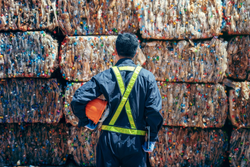 Five million tonnes of plastic waste is produced in the UK each year, half of which is packaging. This plastic waste can last for centuries in landfill, polluting the soil, rivers and oceans as well as harming wildlife. Recent studies have also suggested that microplastic particles even find their way into the human body, causing damage to organs.
Five million tonnes of plastic waste is produced in the UK each year, half of which is packaging. This plastic waste can last for centuries in landfill, polluting the soil, rivers and oceans as well as harming wildlife. Recent studies have also suggested that microplastic particles even find their way into the human body, causing damage to organs.
Recycling of plastic packaging has increased fourfold since the 2000s but there is still more to do. To reduce plastic waste and encourage recycling, a new plastic packaging tax came into force on 1 April 2022, imposing a £200/tonne tax on any plastics containing less than 30% recycled material.
The Plastic Packaging Tax (PPT) makes it more important than ever to have a reliable way of determining the level of recycled content within plastic packaging. BSI Flex 6228 has been developed as a fast-track Flex standard to meet this urgent need.
What is PPT for and how will it work?
The aim of PPT is to reduce plastic waste and encourage recycling. It will create an economic incentive for businesses to use more recycled plastic in their plastic packaging, creating greater demand and helping to stimulate the recycled plastics industry. In turn, this should divert more plastic from landfill sites.
However, it is very important that industry prepares for the change. It is expected that 20,000 manufacturers and importers of plastic packaging will be impacted, with an annual administrative burden of £400,000. However, an estimated 80% of businesses who will need to register, report that they have not yet done so.
How can you tell what percentage of packaging is recycled?
To comply with the new tax rules, UK organisations will need to review their systems and processes, taking action where necessary. This might involve an assessment of supply chains and pricing as well as data collection and reporting.
With this activity taking place between plastic purchasers and suppliers, it is essential that a shared understanding exists of how the 30% recycled figure is reached and can be tested and verified.
This is where BSI Flex 6228 will be invaluable to industry. The standard provides a shared, consensus-based document for testing labels of recycled PET plastics.
BSI Flex 6228 was created using an innovative new format that enables rapid development of a standard that is then improved through repeated iteration. In the longer term, the Flex standard may be developed into a full standard.
What does the Flex standard cover?
The Flex standard is required to help protect the sustainable business philosophy in the UK from fraudulently declared imports from abroad, and to ensure UK recyclers don’t miss out on the sales increases they could otherwise expect to gain.
BSI Flex 6228 covers:
- Criteria, testing methods, and reporting requirements for indicating levels of recycled PET/rPET in PET packaging products
- Test methods of thermal (DSC/TGA), colourimetry and UV-visible spectrophotometry
- PET packaging products including rigid products and plastic pellets
The standard can help manufacturers and importers of PET packaging products to efficiently and reliably:
- Comply with requirements of the Plastic Packaging Act 2022
- Identify fraudulently declared imported plastic packaging
- Take advantage of increased demand for at least 30% recycled packaging
- Grow sustainably
- Trade more easily
- Develop expertise with recycled PET packaging
BSI Flex 6228 can also be used to demonstrate a commitment to sustainable packaging, contribute to the UK’s Clean Growth Strategy and Net Zero ambitions, and help reduce GHG emissions.
BSI Flex 6228 can be downloaded for free now – and you can help to improve it.
As a Flex document, the standard will be refined and improved through comments from users, helping to quantify recycled content to exact fractions and finalise a working industry standard and test method for recycled content certification. You can comment until 30 September 2022 here.
Download the standard now and let us know what you think

 Five million tonnes of plastic waste is produced
Five million tonnes of plastic waste is produced 